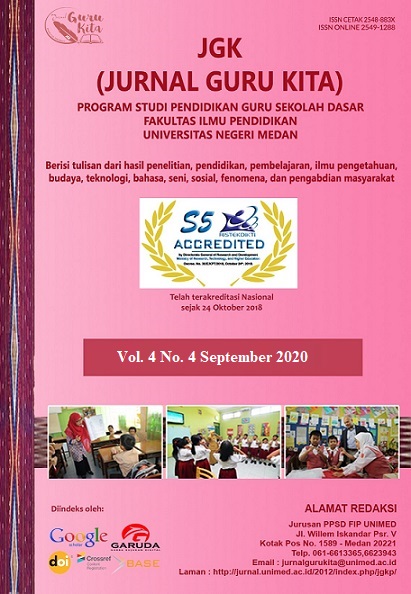MENINGKATKAN HASIL BELAJAR DAN KEMAMPUAN BERPIKIR KRITIS SISWA MELALUI PENERAPAN STRATEGI PEMBELAJARAN BERBASIS MASALAH DI KELAS XI MIPA 4 SMA NEGERI 1 LUBUKPAKAM TAHUN PELAJARAN 2018/2019
DOI:
https://doi.org/10.24114/jgk.v5i4.37564Keywords:
Learning Outcomes, Critical Thinking Ability, Problem Based Learning StrategiesAbstract
Abstract: Improving Students' Learning Outcomes and Critical Thinking Skills Through Application of Problem-Based Learning Strategies in Class Xi Mipa 4 Sma Negeri 1 Lubukpakam 2018/2019 Academic Year. This action research aims to determine the improvement of learning outcomes and students' critical thinking skills in Biology subjects with the implementation of problem-based learning strategies in class XI MIPA 4 SMA Negeri 1 Lubukpakam in the 2018/2019 school year. The subjects of this study were students of class XI MIPA 4 SMA Negeri 1 Lubukpakam for the 2018/2019 academic year, totaling 36 people. The implementation of this research was carried out in two cycles, with stages: planning, action, observation, and reflection. The data obtained in the form of learning outcomes, critical thinking skills and observation sheets of learning activities. From the results of research in cycles I and II, it shows that: (1) the average value of student learning outcomes in Biology subjects has increased in each cycle, namely: cycle I = 74.44, cycle II = 81.67, and learning mastery has an increase in each cycle, namely the first cycle = 75.00% (27 people), the second cycle = 88.89% (32 people); (2) the average value of students' critical thinking skills increased in each cycle, namely: cycle I = 73.06, cycle II = 80.00, and the completeness of students' critical thinking skills increased in each cycle, namely cycle I = 72.22 % (26 people) and cycle II = 86.11% (31 people). The conclusion of this study is that problem-based learning strategies have a positive effect on improving student learning outcomes and critical thinking skills in Biology subjects in class XI MIPA 4 SMA Negeri 1 Lubukpakam 2018/2019 academic year.References
Adnyana, G.P. 2009. Meningkatkan Kualitas Aktivitas Belajar, Keterampilan Berpikir Kritis, dan Pemahaman Konsep Biologi Siswa Kelas X-5 SMA Negeri 1 Banjar Melalui Penerapan Model Pembelajaran Berbasis Masalah. Jurnal Pendidikan Kerta Mandala, (Online), Volume 1, Nomor 001, (http://putradnyana-ptk, diakses tanggal 19 Oktober 2010).
Afcariono, Muhammad. 2008. Penerapan Pembelajaran Berbasis Masalah untuk Meningkatkan Kemampuan Berpikir Kritis Siswa pada Mata Pelajaran Biologi. Jurnal Pendidikan Inovatif, (Online), Volume 3, Nomor 2, (http://jurnaljpi.files.wordpress.com, diakses tanggal 19 Oktober 2010).
Arends, Richard I. 2008. Learning to Teach Seventh Edition: Belajar untuk Mengajar Edisi Ketujuh. Terjemahan oleh Helly PrajitnoSoetjipto. 2008. Yogyakarta: Pustaka Pelajar.
Arikunto, Suharsimi. 2002. Prosedur Penelitian Suatu Pendekatan Praktek. Jakarta: Rineka Cipta.
Chin, Christine dan Chia Li-Gek. 2008. Implementing Problem-Based Learning in Biology, Singapore: Nanyang Technological University.
Corebima. 2006. Review on: Learning strategies having bigger potency To empower thinking skill and concept Gaining of lower academic students. Universitas Negeri Malang.
Dimyati dan Mudjiono. 2006. Belajar dan Pembelajaran. Jakarta : Rineka Cipta.
Hamalik, O. 2001. Proses Belajar mengajar. Jakarta : Bumi Aksara.
Kunandar. 2008. Guru Profesional Implementasi KTSP dan Sukses dalam Sertifikasi Guru. Jakarta: Raja Grafindo Persada.
Sanjaya,W. 2008. Strategi Pembelajaran Berorientasi Standar Proses Pendidikan Jakarta: Kencana Prenada Media Group.
Sudarman. 2005. œProblem Based Learning Suatu Model Pembelajaran untuk Mengembangkan dan Meningkatkan Kemampuan Memecahkan Masalah. Samarinda: FKIP Universitas Mulawarman Samarinda.
Sudaryanto. 2008. Pembelajaran Kemampuan Berpikir Kritis, (Online), (http://www.fk.undip.ac.id, diakses 19 Oktober 2010).
Downloads
Published
How to Cite
Issue
Section
License
Authors published with the JGK (Jurnal Guru Kita) agree to the following terms:
- Authors retain copyright and grant the journal the right of first publication with the work simultaneously licensed under a Creative Commons Attribution License (CC BY-SA 4.0) that allows others to share the work with an acknowledgment of the work's authorship and initial publication in this journal.
- Authors are able to enter into separate, additional contractual arrangements for the non-exclusive distribution of the journal's published version of the work (e.g., post it to an institutional repository or publish it in a book), with an acknowledgment of its initial publication in this journal.
- Authors are permitted and encouraged to post their work online (e.g., in institutional repositories or on their website) prior to and during the submission process, as it can lead to productive exchanges, as well as earlier and greater citation of published work. (See The Effect of Open Access)


























